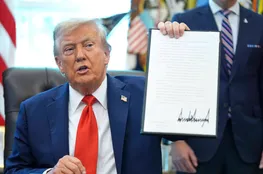James E. Fanell and Bradley A. Thayer articulate in their analysis via American Greatness the steep decline in America's national security situation over the last four years. Stemming from Ronald Reagan's poignant question, 'Are you better off than you were four years ago?', they argue that under the Biden-Harris administration, America's security has deteriorated significantly, along with that of its allies.
Europe's 'long peace' has been shattered by Russia's brutal invasion of Ukraine, marking Europe's first major conflict since World War II. This conflict has led to over a million deaths and has created millions of displaced individuals, causing massive humanitarian fallout and triggering negotiations of potential nuclear escalation. The ripple effects on European stability have been immense, impacting not only immediate neighbors but also broader international relationships.
In the Middle East, the landscape has been further destabilized by Hamas' unprovoked attack on Israel on October 7, 2023, leading to increased aggression from Iranian-backed groups and the direct involvement of Hezbollah and Iran, thereby complicating an already volatile situation. The Biden administration's perceived leniency toward Iran, especially regarding terror financing, has exacerbated tensions, leaving U.S. allies feeling unsupported.
The Indo-Pacific region is also boiling over with unrest, primarily due to aggressive acts by the People's Republic of China (PRC), targeting countries like India, Japan, and the Philippines, and threatening Taiwan. The Biden-Harris administration's failure to effectively counter China's burgeoning influence and aggressive strategies is stark, as the region sees increased military buildups and confrontations.
The authors suggest that the current administration's strategies have failed to curb Russia's and China’s ambitions, leading to a perception of a weakened U.S. on the global stage. This perception, they argue, is reinforced through America's defense policies, which have seen reductions in naval strength at a time when China's navy and military capabilities are expanding significantly.
America's internal policies toward China remain marred by the outdated 'Engagement' approach, which has emboldened Chinese aggression. This continuation of cooperative relations with the CCP contrasts sharply with the stance during the Trump administration, which sought a more confrontational posture. The narrative underscores that Wall Street, academia, and government bodies continue to influence policies that favor engagement, often at the cost of national security.
In sum, the authors argue that the only remedy to these challenges is a departure from current policies, advocating instead for a return to a Reagan-like certainty in dealing with potential adversaries. They position a reformed foreign policy under a Trump leadership as a potential solution to restoring America's strength and global respect. However, they acknowledge that such changes would require a substantial shift in how America operates on the world stage, both strategically and diplomatically.
























